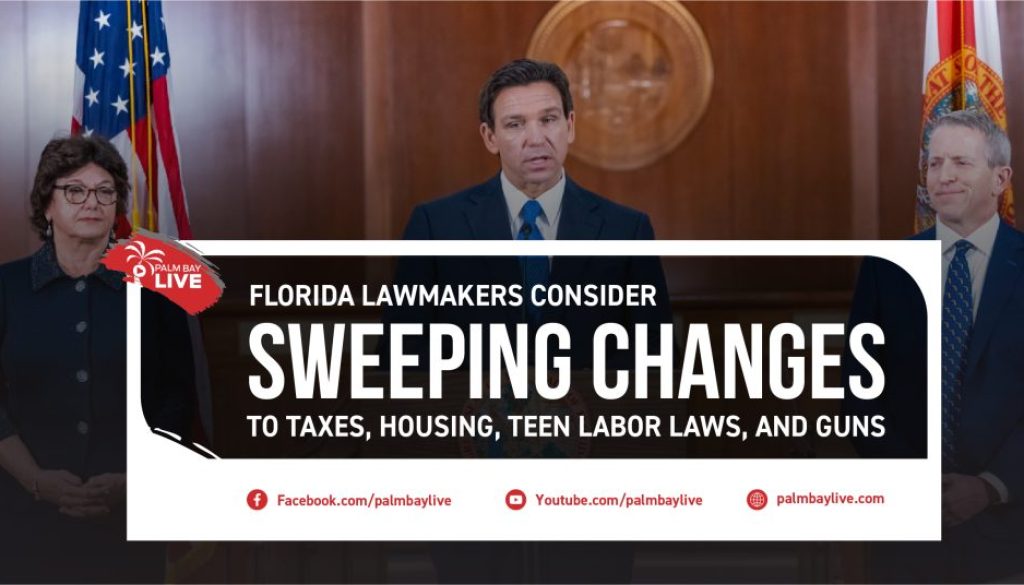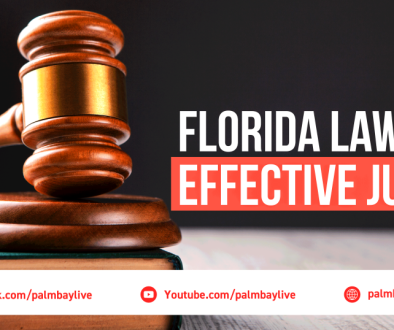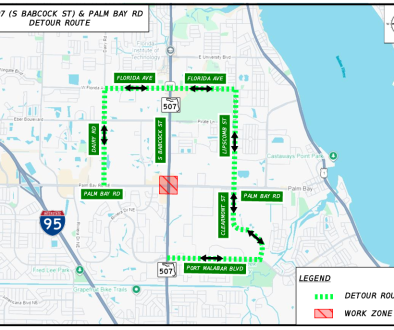Florida Lawmakers Consider Sweeping Changes to Taxes, Housing, Teen Labor Laws, and Guns
Palm Bay, Fla. — With just about a month left in the legislative session, Florida lawmakers are weighing bold proposals that could reshape the state’s tax system, override local land-use regulations, and relax child labor protections and revisit gun laws that were enacted after the Parkland school shooting.. Among the most closely watched bills are Gov. Ron DeSantis’s proposed property tax overhaul, House Bill 943 aimed at expanding affordable housing development, House Bill 759 concerning long gun purchases, and Senate Bill 918, which would loosen work restrictions for minors.
DeSantis Pitches Property Tax Overhaul
Gov. Ron DeSantis is calling for an end to Florida’s state-imposed property taxes, proposing a $1,000 tax break for homestead property owners in place of a $5 billion sales tax cut plan pushed by House Speaker Daniel Perez.
The governor recently unveiled the proposal during a news conference in Orlando, urging lawmakers to refocus the state’s tax relief efforts on residents rather than tourists.
“I want Canadian tourists and Brazilian tourists subsidizing the state and making it so Florida residents pay less taxes,” DeSantis said.
The plan would eliminate the “required local effort” — the portion of property taxes dedicated to school funding — and use state reserves to fill the gap for at least one year. Long-term changes would require a constitutional amendment, which DeSantis hopes to place on the November 2026 ballot.
While the House supports broader sales tax cuts, Senate leaders have expressed caution, noting potential future deficits. Lawmakers must finalize the state budget before the session ends on May 2.
HB 943 Would Expand State Control Over Housing
Meanwhile, in the House, Rep. Vicki Lopez, R-Miami, is spearheading legislation to expand the scope of the Live Local Act, a 2023 law that encourages developers to build affordable housing by bypassing local zoning restrictions. House Bill 943 would further limit the authority of local governments in regulating land use for housing projects.
The bill would require cities and counties to allow multifamily and mixed-use housing on land owned by religious institutions, school boards, and local governments. It also prohibits local officials from reducing height, lot size, or density below the maximums already permitted in a given area.
Municipalities would be barred from imposing new permit fees or delaying approvals through zoning moratoriums. Under HB 943, any attempt to restrict such developments would be considered preempted by state law.
Supporters argue the bill will increase housing supply and reduce construction delays, while critics say it strips local communities of decision-making power and ignores infrastructure concerns.
Senate Panel Advances Controversial Teen Labor Bill
A Florida Senate committee has also advanced legislation that would ease work restrictions for teens. Senate Bill 918 proposes eliminating current limits on how many hours 16- and 17-year-olds can work during the school year, including caps on daily hours and mandated breaks.
The bill would also remove restrictions for 14- and 15-year-olds who are homeschooled, attend virtual school, or have already completed high school, allowing them to work overnight shifts.
Supporters of the bill say it aligns state law with federal standards and increases flexibility for families and businesses facing worker shortages. Critics, however, warn that it could increase risks for teen workers, including academic disruption, fatigue, and potential exploitation — particularly in industries with fast-paced or late-night work.
The bill narrowly passed its first committee stop in the Senate and still faces additional review before it could reach the floor. If signed into law, the changes would take effect July 1.
House Advances Bill to Lower Age for Long Gun Purchases
Florida lawmakers are also revisiting gun legislation passed in the aftermath of the 2018 Parkland school shooting. The Florida House recently approved House Bill 759, which would lower the minimum age to purchase rifles and shotguns from 21 to 18. The vote passed 78-34.
The current age restriction was enacted under the Marjory Stoneman Douglas High School Public Safety Act, passed just weeks after a 19-year-old gunman killed 17 people at the Parkland high school. Supporters of HB 759 argue that 18-year-olds already carry significant responsibilities, such as military service and jury duty, and should not be barred from purchasing firearms.
Critics, including Democratic lawmakers and gun safety advocates, point to recent court rulings upholding the constitutionality of the existing age limit. They also warn that repealing the law could undermine public safety and dishonor the memory of the Parkland victims.
While the House has passed similar measures in recent years, the Senate has so far declined to take them up. This year may be no different, as the Senate companion bill has yet to receive a committee hearing. Senate leadership has not committed to supporting the proposal, and its future remains uncertain.
Gov. DeSantis, however, has signaled support for rolling back the age requirement, as part of his broader push to expand Second Amendment protections in the state.
What’s Next
With the legislative session set to end May 2, lawmakers are expected to intensify negotiations over tax policy, housing reform, and labor law changes. Voters and stakeholders are closely monitoring how these proposals might affect local autonomy, economic development, and protections for vulnerable populations.




